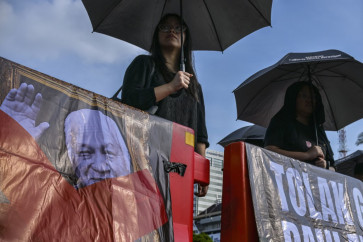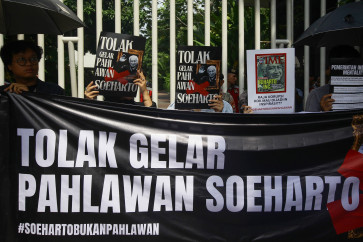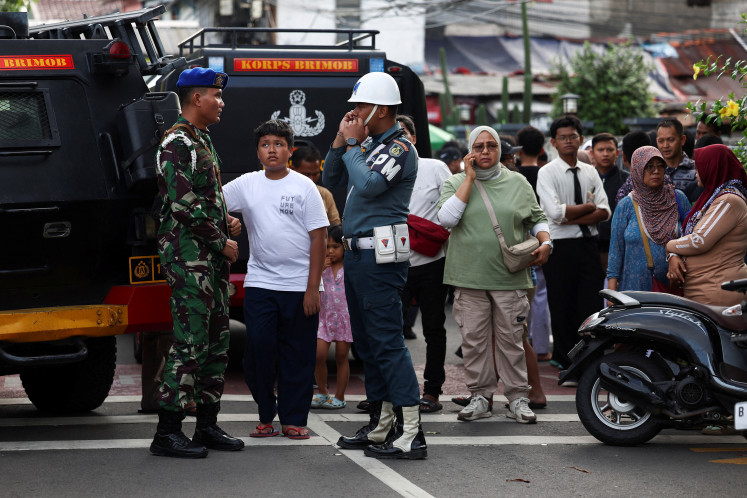Popular Reads
Top Results
Can't find what you're looking for?
View all search resultsPopular Reads
Top Results
Can't find what you're looking for?
View all search resultsMuslim millennials prone to intolerance: Study
Growing up in an era with greater access to communication, media and digital technology, Indonesian millennials have a good opportunity to learn skills and qualities to be successful in their future
Change text size
Gift Premium Articles
to Anyone
G
rowing up in an era with greater access to communication, media and digital technology, Indonesian millennials have a good opportunity to learn skills and qualities to be successful in their future.
However, frequent interaction with information channels without proper guidance may instead make them prone to radical and intolerant teachings, a study on the religiousness of Muslim millennials has said.
“A tsunami of information makes them overwhelmed. They don’t know what they should hold on to. As a consequence, they are [emotionally] unstable and prone to intolerant views,” said Chaider S. Bamualim, coordinator for the Center for the Study of Religion and Culture (CSRC), in an event to disseminate the study’s results in Jakarta on Friday.
The study involved more than 900 young Muslim activists aged between 15 and 25 years in 18 cities and regencies. Conducted from September to October 2017, the research gathered information through in-depth interviews and focus group discussions.
Like common millennials, Chaider said, Muslim millennials in Indonesia had wide access to information, especially on social media. The problem is, major speakers on the platform are not reliable sources of tolerant teachings, he added.
“They have access to various information channels. However, the viral role models in those channels are questionable,” Chaider said, referring to controversial Islam Defenders Front (FPI) leader Rizieq Shihab.
The story of Umi Nur Khasanah, a young Muslim activist from Surakarta, Central Java, as revealed in the survey report, was quite interesting. During an interview for the survey, Umi said she could live side by side with a non-Muslim neighbor. However, she added that she could not deny that she would feel disturbed if a non-Muslim house of worship was built near her home.
Chaider said Umi’s story was an example of attitudes of the current Muslim millennials, who were actually moderate but also had the potential for intolerance.
Islamic scholar Komaruddin Hidayat said a lack of reliable role models in society had led to the country’s Muslim millennials having a poor understanding of Islamic teachings.
“They are vulnerable to be influenced with radical teachings because their role models are not committed to teachings related to nationalism,” said Hidayat, a lecturer at the Syarif Hidayatullah State Islamic University (UIN) in Jakarta.
A limited reach of knowledge and an ongoing search of true self have also made them more likely to be attracted to follow
conservatism.
CSRC director Irfan F. Abubakar said intolerant views toward other religions mainly lived in the minds of dakwah (missionary endeavors) activists. They have such perspectives due to deep-rooted scripturalistic teachings in their minds.
“Wrong narratives in social media have made them establish an exclusiveness within their community. This is dangerous because it means they will put the interests of their community above others,” Irfan said.
It was revealed in the survey that in many cases, Muslim residents would not protest the construction of a church in their neighborhood before certain parties ignited their anger via social media.
According to the study, more tolerant perspectives have been shown by activists from Islamic student movement groups, such as the Association of Islamic Students (HMI) and the Indonesian Islamic Students Movement (PMII). The groups have interpreted pluralism as a manifestation of Islam in Indonesia and also the country’s destiny.
“The government should intensify the supervision of dakwah activities in schools and strengthen nationalism teachings.”
Anas Saidi from the Presidential Working Unit for the Implementation of the State Ideology of Pancasila (UKP-PIP) acknowledged the strong influence of conservatism among Muslim millennials was a wake-up call for the government to enhance nationalist teachings.
The study’s results corresponded with the findings of a survey commissioned by pluralism watchdog Wahid Foundation last year, which revealed more than 60 percent of 1,626 Muslim activists in school were ready to do jihad. (srs)










